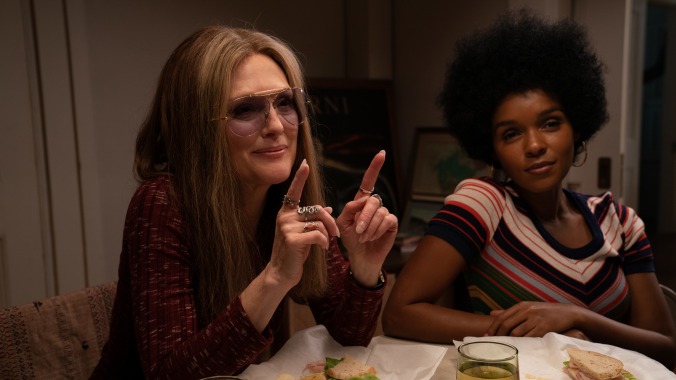Julie Taymor’s unfocused biopic The Glorias offers 4 Gloria Steinems but no insight


Midway through The Glorias, there’s a scene where Gloria Steinem (Alicia Vikander), famous spokeswoman for the American feminist movement, is gamely tolerating sexist questions from a leering talk-show host who describes her outfit—a black long-sleeved shirt and black jeans—as inappropriately “sexy.” Suddenly, the set breaks apart, the bright white lights turn blood red, and a CGI tornado starts whipping through the studio. Steinem imagines herself first as a nun, then as a Playboy bunny, then as a wicked witch whose cackling face grows to gigantic, emasculating size as the creep cowers in terror. Men won’t respect her no matter what she wears, so they might as well fear her instead. The moment is certainly out there, and a little jarring in how suddenly it launches into full-blown surrealism. But it’s also exciting: Finally, a scene that vaults over scattered and lands on bonkers.
The Glorias has been written and helmed by Julie Taymor, which does guarantee a little spectacle. A stage director who transitioned to filmmaking after the success of The Lion King on Broadway, Taymor is known for elaborate choreography and musical whimsy, both accounted for in this film to varying degrees. Some of the choreography is impressive and engaging; take, for example, the scenes set at the 1977 National Women’s Conference that show the chaotic, joyful whirl of thousands of women from all over the country coming together in a common cause. But for the most part, Taymor puts her theatrical tendencies toward pointless ends in The Glorias, whooshing around a young Steinem at her typewriter while underplaying major moments in the activist’s life. The result is a choppy mix of timelines, color schemes, and differing levels of realism that’s too unfocused to really inspire.
Based on Steinem’s 2015 memoir My Life On The Road, The Glorias frames activism as a path of perpetual forward motion and personal sacrifice, and Taymor does do a decent job of conveying the weariness of a life lived in hotel rooms and airports. Or perhaps it’s just an exhausting film, clocking in at nearly two and a half hours and featuring multiple actors portraying Steinem at various points in her life. As a child, she’s played by Ryan Kiera Armstrong; a teenager, Lulu Wilson; a young adult, Vikander; and as an older, wiser Gloria, Julianne Moore. Moore is the only one who brings any real warmth to the role, doling out wisdom to her younger selves as they ride together on a Greyhound bus meant to symbolize life’s journey. The rest capture Steinem’s look and accent but not her ambition and passion—or even her politics, really.
The film as a whole doesn’t have a very strong grasp on Steinem as a person, except that she’s modest and a good listener. After an hour of backstory emphasizing her relationship with her huckster father (Timothy Hutton), The Glorias settles into a groove of loosely chronological vignettes strangely preoccupied with depicting Steinem as a perfect white ally. The intentions behind this may have been good: It does give Taymor the chance to work figures like Wilma Mankiller (Kimberly Guerrero), Dorothy Pittman Hughes (Janelle Monáe), and Flo Kennedy (Lorraine Toussaint) into Steinem’s more famous story. But Taymor’s oversimplified intersectional kumbaya moments not only fail to see these women as anything besides Steinem’s Black (or Native) best friends, they do a disservice to the thorny reality of racial tensions in the women’s movement, then and now. In fact, the only supporting player whose personality really shines is Bette Midler as feminist lawyer and Congressional candidate Bella Abzug—a white Jewish woman.
Taymor’s stagey approach does offer a few advantages: It makes the unreality of the cheap-looking CGI go down a little easier, and helps soften chunks of expository dialogue thick enough to choke on. (No real-life character is spotted without her full name and historical significance stated immediately afterwards.) There are origin stories in this film that make Solo: A Star Wars Story look subtle, from Steinem buying her signature oversized glasses because they “hide [her] beautiful face” to a salt-of-the-earth cab driver quipping, “If men could get pregnant, abortion would be a sacrament.” One expects a fish on a bicycle to pedal by at some point—and almost wishes it would, just to fulfill the promise of those kaleidoscopic early scenes by going all the way over the top. Then no one could accuse these feminists of being humorless.